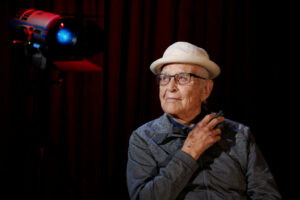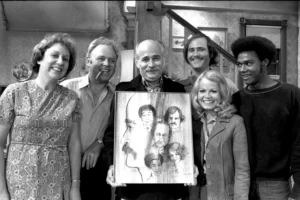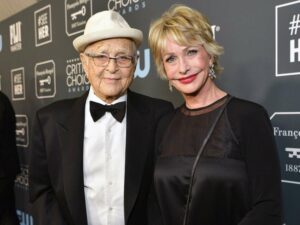The Legacy of a Mentor and Father Figure
When Norman Lear died earlier this month, he left behind a legacy that extended far beyond television into the hearts of those he touched. Among them is Rob Reiner, who considers Lear not just a mentor but a second father who shaped both his career and worldview.
Reiner, son of late comedy legend Carl Reiner, first captured America’s attention on “All in the Family,” portraying Michael Stivic, the liberal son-in-law to Carroll O’Connor’s bigoted Archie Bunker. Archie’s nickname for him, “Meathead,” became iconic. This groundbreaking role earned Reiner two Emmy Awards and three additional nominations.
The pioneering sitcom was one jewel in Lear’s crown of trailblazing comedies that revolutionized television by tackling controversial social issues with humor and humanity.

A Lesson in Common Humanity
Among the many memorable episodes, one holds special significance for Reiner. Mike and Archie, known for their constant ideological battles, find themselves locked together in a cellar. What unfolds is a powerful moment of human connection that transcends their political differences.
“They start to come together and they realize that they love each other, even cutting through all of the disharmony,” Reiner recalls. “I look at that as one of the best episodes because what it says is you can connect with people, even if you’re of different political stripes, because there may be a common humanity underneath that.”
This message resonates powerfully today in our era of deep political polarization, reminding us that beneath our disagreements lies a shared humanity that can bridge even the widest ideological divides.

A Relationship Spanning Decades
Reiner’s connection to Lear began long before “All in the Family.” He had known Lear since childhood, and their relationship was built on mutual respect and genuine affection.
“Norman was the first guy to recognize that I had a sense of humor, and he’s been my champion for a long time,” Reiner shares. “Got me started in my directing career. I’ve said many times he’s like a second father to me. I’ve been very lucky to have him as a role model, along with my own father.”
Learning Through Observation
What’s striking about Reiner’s relationship with both his father and Lear is how they imparted wisdom—not through formal lessons, but through example.
“It’s interesting because both my father and Norman, there was never any kind of ‘let’s sit down and give you advice’ about anything,” Reiner explains. “What I got from them was just being around them and seeing how they conducted their lives. I saw how my dad conducted his career, how he treated other people. I saw how Norman used what he had and his strength of convictions, to stick to his guns and not back down from what he believed.”

Using Fame for Social Impact
Lear didn’t just create entertaining television; he used his shows as vehicles for social change. He was one of the founders of People for the American Way, an organization created to fight right-wing extremism and build a democratic society.
“I saw with Norman, not only just in the shows that he did, the subject matters he touched on, but he also taught me that you can take your celebrity, your fame and use it to advance certain issues,” Reiner says.
Following in Lear’s footsteps, Reiner has produced “God + Country,” a documentary releasing February 16th that examines the rise of Christian nationalism in America—a topic directly connected to the work Lear began with People for the American Way.
From Acting to Directing: A Stellar Career
After “All in the Family,” Reiner transitioned to directing, where he truly found his voice. His filmography reads like a greatest hits of American cinema: “Stand by Me,” “The Princess Bride,” “When Harry Met Sally…,” “Misery,” and “A Few Good Men.”
Reiner’s first major directorial effort was “This Is Spinal Tap” in 1984, a mockumentary that helped define an entire genre. The film’s influence on comedy cannot be overstated, earning a place in the National Film Registry.
Returning to Spinal Tap
Now, four decades later, Reiner is directing his first-ever sequel: “Spinal Tap 2,” with shooting beginning in February. For years, fans urged him to make a sequel, but the team resisted until they found the right concept.
“For years, everybody kept saying, ‘You should do a “Spinal Tap 2.”‘ And none of us ever wanted to do it because we have to have an idea of something that would make you want to do it,” Reiner explains. “And we did come up with an idea that we liked.”
Creating a sequel to such a beloved film presents unique challenges. “We were very nervous about doing a second one because it has become a classic, a cult classic, and it’s in the National Film Registry,” Reiner acknowledges. “And so sometimes you say, ‘I don’t want to touch that.’ But I think we have a way of doing it that will be different and hopefully people will enjoy it.”
A Lasting Legacy
As Reiner prepares for this new chapter, he carries the lessons instilled by two remarkable men: his father and Norman Lear. Both taught him that entertainment can be more than escapism—it can be a vehicle for social commentary and positive change.
Lear’s influence lives on not only in the groundbreaking shows he created but in filmmakers like Reiner who continue to push boundaries and use their platforms to advocate for justice and understanding. In a time when political divisions seem insurmountable, the message from that cellar scene feels more relevant than ever: beneath our disagreements exists a common humanity that can connect us if we’re willing to see it.